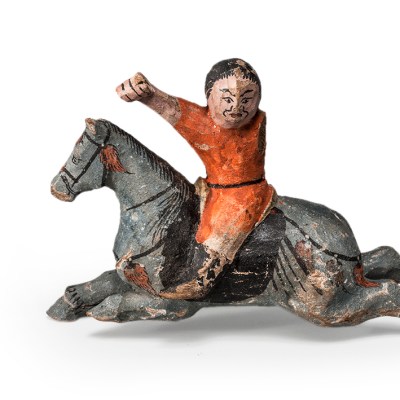Running through a list of the 20th century’s most interesting artists, Susan Harris found each had only one thing in common — they were all women, from the expressionists to Bauhaus. New York based Harris had been approached by The Armory Show about a commission for which the brief was to ‘activate the entire pier’.
Harris’ list went on to form the basis for ‘Venus Drawn Out’, a four-part discussion on women in art. One of the first works on show is a large-scale drawing on two perpendicular walls by Pat Steir. Pat’s lines dominate the space; set against a bold purple wall her drawing has an infinite quality. It’s the first image people will encounter when they move from the contemporary pier to the modern.
This is both The Armory Show’s first ever curated display, and the first dedicated entirely to women — the tribute wasn’t intentional. ‘It became that, but that’s not where it started. I was thinking, what would I want to see? All these artists came into my head and they were all women and I thought — how interesting to feature artists from the 20th century.’
It’s a show that bears equal elements of activism and lessons in art history. Susan is careful to point out that alongside an examination into the issue of representation and women, the show focuses on significant drawings and paintings. ‘Both myself and Pat are hesitant to talk about the women aspect too much, but yes, and I think Pat will also acknowledge that she’s frustrated at not achieving the same success as her male counterparts’.
Part of ‘Venus Drawn Out’ is formed of an exhibition of drawings by artists (from the unknown to the highly acclaimed), in which works by the likes of Anni Albers and Helen Frankenthaler are displayed without a clear chronological or thematic order. ‘The goal was for people to take away ideas, but I really wanted there to be value in the viewing experience, so I felt intuitively that drawing would be the best way. I installed the show salon style to really draw people in, the style changes how people see a collection’. It’s a method of curation that references institutions such as The Barnes Foundation and the Frick Collection, famous for displaying the work of men in salon style.
‘Venus Drawn Out’ is careful not to ghettoise women by gender, and issues of representation and ownership are examined through scale, medium and sheer location. It’s an apt study for The Armory Show, and all it represents as an institution for collectors and artists both male and female. ‘It has been an issue, some of the galleries represent female artists and some don’t. Some of the galleries I was working with, dealers are even saying ‘why are the prices so much lower with female artists?’ I made a wish list of everyone I would want to include and then contacted the galleries to see what they could lend me. It was much harder than I thought it would be. The placing of ‘Venus Drawn Out’ at the Armory makes it even more poignant’.
The Nicotine Flower, Special No. 36 (1920), Georgia O’Keeffe. Image courtesy of the Gerald Peters Gallery, NY

Does she think young women in art are too often tied to themes intrinsic to notions of femininity? Sort of: ‘In the 1970s feminism meant that things changed radically but before that people like Georgia O’Keeffe weren’t trying to say ‘I’m a woman artist’ she just wanted to be an artist and she totally rejected those Freudian interpretations of her flowers. It wasn’t until the 1970s that women wanted to be seen as female artists’.
Further down the pier, a 15ft-high drawing by Inka Essenhigh acts as the fourth part of this commission: a submission by Pace Prints, Inka is the youngest artist to exhibit. ‘If I’d had more space I would have liked to open up the perimeters to include younger artists, because it’s so much about the influence of these works’.
The show’s name is a humorous nod to the view of women and drawing as passé. ‘I love drawings and I think the evolution of drawing has certainly expanded what the traditional definition of that medium is.’ The title too acknowledges the frustrations in the long process of achieving significance for women, the idolisation of Venus and the issue of legitimate representation in art history.
‘Venus Drawn Out’ is at The Armory Show, New York, from 6–9 March 2014.








